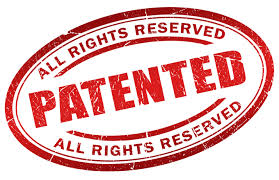patent
英 [ˈpeɪ.tənt]
美 [ˈpæt.ənt]
- vt. 授予专利;取得…的专利权
- adj. 专利的;新奇的;显然的
- n. 专利权;执照;专利品
使用频率:

记忆方法
1. 怕被传出去(伸展).
2. 爬(pa)进帐篷(tent),窃取专利。
2. 爬(pa)进帐篷(tent),窃取专利。
中文词源
patent 专利,专利的,明显的
来自拉丁语patere,展开,摊开,来自PIE*pete,展开,词源同petal,feather.-ent,现在分词后缀。引申词义公开的,明显的。词义专利缩写自letters patent,公开信,原指政府公文。
英语词源
- patent
-
patent: [14] Etymologically, patent means simply ‘open’. Its ultimate source is patēns, the present participle of the Latin verb patēre ‘be open’ (a relative of English fathom and petal). It was used particularly in the term letters patent, which denoted an ‘open letter’, particularly an official one which gave some particular authorization, injunction, etc.
It soon came to be used as a noun in its own right, signifying such a letter, and by the end of the 16th century it had acquired the meaning ‘exclusive licence granted by such a letter’. This gradually passed into the modern sense ‘official protection granted to an invention’.
=> fathom, petal - patent (n.)
- late 14c., "open letter or document from some authority," shortened form of Anglo-French lettre patent (also in Medieval Latin (litteræ) patentes), literally "open letter" (late 13c.), from Old French patente (see patent (adj.).
The Letters Patent were ... written upon open sheets of parchment, with the Great Seal pendent at the bottom ... [while] the 'Litteræ Clausæ,' or Letters Close, ... being of a more private nature, and addressed to one or two individuals only, were closed or folded up and sealed on the outside. [S.R. Scargill-Bird, "A Guide to the Principal Classes of Documents at the Public Record Office," 1891]
Meaning "a license covering an invention" is from 1580s. - patent (v.)
- "to obtain right to land," 1670s, from patent (n.). The meaning "copyright an invention" is first recorded 1822, from earlier meaning "obtain exclusive right or monopoly" (1789), a privilege granted by the Crown via letters patent. Related: Patented; patenting.
- patent (adj.)
- late 14c., in letters patent, literally "open letter," from Old French patente, from Latin patentum (nominative patens) "open, lying open," present participle of patere "lie open, be open," from PIE *pete- "to spread" (see pace (n.)). Sense of "open to view, plain, clear" is first recorded c. 1500. Related: Patently.
权威例句
- 1. He wore patent leather shoes.
- 他穿着漆皮鞋。
- 2. P&G applied for a patent on its cookies.
- 宝洁公司为它的饼干申请专利权。
- 3. It sued Centrocorp for patent infringement.
- 它诉Centrocorp公司侵犯专利权。
- 4. It is patent to all that this is a good chance.
- 大家都明白这是一个好机会.
- 5. The trademark is registered on the book of the Patent Office.
- 该商标已在专利局登记注册.
